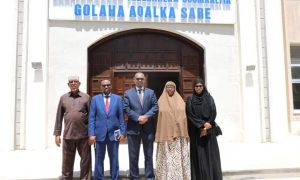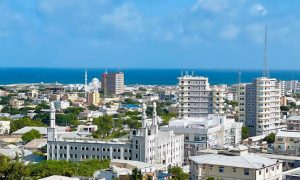
Muqdisho, 21, June, 2015 –Contrary to the ebullient public statements of Ambassador Nicholas Kay, the Special Representative of the UN Secretary General for Somalia like “Somalia is Coming Together,”Somalis are reallyconcerned about the slipping away of the Somali national unity, the handling of the Somali maritime petition against Kenya at the International Court, political and social injustice, violations of individual human rights, illegal confiscation of private property and public lands, stifling of genuine public political participation, unreliable and sometime degrading security and economic conditions and prospects, and overall uncertain future.The public opinion on the federal government shifted tounfavorabledirectionbecause the actions and behavior of leaders are seen as flouting public services obligations, standards, and ethics.
By dominating the running of the federal government affairs, critics accuse the office of the president all sorts of excesses and missteps. Well placed officials admit the inability to addresssystematically, effectively, and efficiently identified problems for higher interventions. Loyalty to the country, rule of law, and common good is not seen as a noble mission.
Daily Cartoons of Amin Amircapture public discontent. June 17 Cartoon redefines “Vision 2016” as big money bagcarried by President Hassan with two Damul Jadid members on the top and displaying the ugly crimes- clannism, fleecing national treasury, abuse (injustice), and embezzlement of money. June 14 Cartoon shows poor people ordered to move out of their houses under road construction excuse but their land wanted for personal profit. June 10 cartoon presents the picture of young man named Ali Yare (Ali Abdi Wardhere) in chokeholdby the President whilethe Security Chiefis asked to manufacture criminalcase against him. Ali is in the custody of the intelligence services for more than a week without judicial process and relative visitation. Members of Parliament and other Somali activists have lunched media campaign for his freedom and release.
Caasimada Website has published on 17 June a report highlighting the appalling condition of large number of detainees in Mogadishu Central Prison without judicial process. The detainees and their families are crying out for fair and speedy trail, while at the same time they are very much concerned about the treatment of detainees in the prison and the integrity of the judicial system repeatedly criticized by the international human rights watch organizations.
The most troubling story is the lack of payments to the security forces and the civil servants of the Federal Government for aboutfour to six months. It is disingenuous to expect credible public securityand the provision of free (less) corruptiongovernment services by public servants who did not receive theirmeagre monthly salary and who constantly hear misuse ofpublic money.
Audaciously, responsibly, and commendably, the deputy auditor general has issued an instruction that prohibits payments of other expenditures before salaries to the security forces and government civil servants as required by the budget act. This is unprecedented act that merits praise and support.The Auditor General reported the revenue collection of 31.5 million dollars in three months.
These stories and many others have captivated the attention, concern, and conscience of the people in Mogadishu.Unfortunately, against their political, moral, and legal responsibilities, the Federal Parliament representing the people of Somalia and the UN Mission for Somalia are remainingsilent and indifferent.
The fundamental problem facing the federal government istrust deficit created by the mismatch between actions and responsibilities, commitments, and declarations. Thetrust deficit constitutes a major obstacle to the collaboration between federal government and people.
On June 12, 2015, President Hassan Sheikh Mohamud held about 34 minutelong press conferencein which he responded obdurately to pervasivepublic discontent about many domestic issues.Even though the public perception of security is different from the one projected by the federal government and International Community circles protected by bullet proof cars, well-armed guards, roadblocks, and security zones, President Hassan claimedimprovement of security situation except the threats from Al Shabab (UGUS).He insisted on moving the federation process forward whilehe lamented about the equality status between federal and regional authorities. He attributed the worsening of the economic condition of the country to the closure of remittances, disappearance of Somali shilling from circulation, lack of external budget support provided to peaceful countries, and the use of EVC. He demanded the Somali citizens to pay taxes to the federal government and to regional states.
He denied imminent reshuffle of Council of Ministers but forewarned possible dismissal of inefficient and incompetent Ministers, Deputy Ministers and other officials. He asked the Somali people to be patient and to have confidence in government. Finally, He appealed to the Somali people to stop the gnawing criticism against the federal government.
Adam Smith International, a professional services business managing Somalia Stability Fund, published in the Guardiana conversation with Prime MinisterOmar Abdirashid directed to regain thelost support of the international community. In the conversation, the PM echoed the argument of President Hassan by saying that “In Somalia there is no bigger challenge than the propensity, by most, to conveniently forget where we came from…….People are ignoring that there is a progress and great room for optimism.” This reflects the standard defensive response of the leaders of the federal government to public discontent.
To counter the general consensus that the federation process is in jeopardy after serioussetbacks, PM Omar claimed that “his administration is working hard to strike a healthy balance between historical fears of a highly centralized and authoritarian central government and the risk of fragmentation.” That responsibility of balancing in law lies with the federal parliament and not with him and the Council of Ministers.
The federal parliament dissolved the parliament of Jubba Administration. The parliamentary decision preempts all mediations and requires compliance. But, Somalia Media reports that Ethiopia ismediating Jubba and Southwest Administrations over Jubba Parliament in Addis Ababa, while Ambassador Nicholas Kay is mediating Jubba Administration and the Federal Government in Kismaio over the same matter.
The federal government and Ahlu Sunna Wal Jama (ASWJ) are engaged in reconciliatory talks after the letter captured Dhusamareb (Galgudud) and chased away the federal government faction. The aim is to secure the inclusion of ASJW in Galmudug State.But long-running mistrust between parties impedes progress, which may call in foreign mediators.
Themembers of parliament of Hawadle Communitywrote a letter to the President telling him in clear terms that Hiran region chose to be directly administered by the federal government in accordance with article 48 (2) of the provisional constitution. This closes the door for the merger between Hiran and Middle Shabelle regions.
The leaders of Khatumo State are blaming the federal Government for unfair treatment.
Puntland rejected the new constitution approved by the delegates of Galmudug state. It continues to protest against the tampering of 18 clauses of the Provisional Constitution approved on August 1, 2012 and against the lack of implementation of long list of agreements with the federal government. It interprets the Constitution unilaterally. Itis threating to repudiate the federal government.
The impact of the Press Conference of President Hassan and the conversation withthe PM Omar Abdirashid has yet to be verified. But,the action of the International Community to entrust the implementation of six programs approved on June 17 through Somalia Development and Reconstruction Facility (SDRF)UN agencies in Nairobi instead of Somali Institutions shows a no confidence in the Federal Government.
The Federal Parliament is not absolved from the public discontent. It is reported that the federal parliament usually works only 216 hours for a whole year. In the last recess, only 50 members of parliament visited their constituencies. The federal parliament flunked to ensure public participation in the political and legislative process and to exercise effective oversight over government institutions for accountability and transparency.Short of accepting to respond positively to the public discontent and international concerns, the trust deficit of the Somali leaders will destroy the hope for better future of Somalia.
Mr. Mohamud M Uluso
mohamuduluso@gmail.com
_____________________________________________________________________________________Xafiiska Wararka Qaranimo Online | Mogadishu, Somalia
_____________________________________________________________________________________Advertisement
_____________________________________________________________________________________






